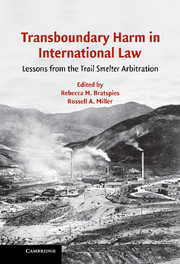Book contents
- Frontmatter
- Contents
- Contributors
- Acknowledgments
- Foreword by David D. Caron
- TRANSBOUNDARY HARM IN INTERNATIONAL LAW
- Introduction
- PART ONE THE TRAIL SMELTER ARBITRATION – HISTORY, LEGACY, AND REVIVAL
- 1 “An Outcrop of Hell”: History, Environment, and the Politics of the Trail Smelter Dispute
- 2 The Trail Smelter Dispute [Abridged]
- 3 Of Paradoxes, Precedents, and Progeny: The Trail Smelter Arbitration 65 Years Later
- 4 Pollution by Analogy: The Trial Smelter Arbitration [Abridged]
- 5 Has International Law Outgrown Trail Smelter?
- 6 The Flawed Trail Smelter Procedure: The Wrong Tribunal, the Wrong Parties, and the Wrong Law
- 7 Rereading Trail Smelter [Abridged]
- 8 Trail Smelter and the International Law Commission's Work on State Responsibility for Internationally Wrongful Acts and State Liability
- 9 Derivative versus Direct Liability as a Basis for State Liability for Transboundary Harms
- 10 Transboundary Pollution, Unilateralism, and the Limits of Extraterritorial Jurisdiction: The Second Trail Smelter Dispute
- PART TWO TRAIL SMELTER AND CONTEMPORARY TRANSBOUNDARY HARM – THE ENVIRONMENT
- PART THREE TRAIL SMELTER AND CONTEMPORARY TRANSBOUNDARY HARM – BEYOND THE ENVIRONMENT
- Annex A Convention Between the United States of America and the Dominion of Canada Relative to the Establishment of a Tribunal to Decide Questions of Indemnity and Future Regime Arising from the Operation of Smelter at Trail, British Columbia
- Annex B Trail Smelter Arbitral Tribunal Decision, April 16, 1938
- Annex C Trail Smelter Arbitral Tribunal March 11, 1941, Decision
- Index
8 - Trail Smelter and the International Law Commission's Work on State Responsibility for Internationally Wrongful Acts and State Liability
Published online by Cambridge University Press: 08 September 2009
- Frontmatter
- Contents
- Contributors
- Acknowledgments
- Foreword by David D. Caron
- TRANSBOUNDARY HARM IN INTERNATIONAL LAW
- Introduction
- PART ONE THE TRAIL SMELTER ARBITRATION – HISTORY, LEGACY, AND REVIVAL
- 1 “An Outcrop of Hell”: History, Environment, and the Politics of the Trail Smelter Dispute
- 2 The Trail Smelter Dispute [Abridged]
- 3 Of Paradoxes, Precedents, and Progeny: The Trail Smelter Arbitration 65 Years Later
- 4 Pollution by Analogy: The Trial Smelter Arbitration [Abridged]
- 5 Has International Law Outgrown Trail Smelter?
- 6 The Flawed Trail Smelter Procedure: The Wrong Tribunal, the Wrong Parties, and the Wrong Law
- 7 Rereading Trail Smelter [Abridged]
- 8 Trail Smelter and the International Law Commission's Work on State Responsibility for Internationally Wrongful Acts and State Liability
- 9 Derivative versus Direct Liability as a Basis for State Liability for Transboundary Harms
- 10 Transboundary Pollution, Unilateralism, and the Limits of Extraterritorial Jurisdiction: The Second Trail Smelter Dispute
- PART TWO TRAIL SMELTER AND CONTEMPORARY TRANSBOUNDARY HARM – THE ENVIRONMENT
- PART THREE TRAIL SMELTER AND CONTEMPORARY TRANSBOUNDARY HARM – BEYOND THE ENVIRONMENT
- Annex A Convention Between the United States of America and the Dominion of Canada Relative to the Establishment of a Tribunal to Decide Questions of Indemnity and Future Regime Arising from the Operation of Smelter at Trail, British Columbia
- Annex B Trail Smelter Arbitral Tribunal Decision, April 16, 1938
- Annex C Trail Smelter Arbitral Tribunal March 11, 1941, Decision
- Index
Summary
INTRODUCTION
On August 9, 2001, the International Law Commission (ILC) adopted Draft Articles on the Responsibility of States for Internationally Wrongful Acts (Draft Articles) together with detailed Commentaries. The Draft Articles – the product of nearly fifty years' work – represent an important step in the codification and development of international law. In their preface, the Commentaries describe the Draft Articles as comparable in significance to the 1966 Draft Articles on the Law of Treaties that became, with limited changes, the 1969 Vienna Convention on the Law of Treaties.
State responsibility involves the consequences to states of their internationally wrongful activities. Draft Article 1 stipulates that every internationally wrongful act of a state entails the international responsibility of that state. Internationally wrongful acts take two forms: (1) breach of an international obligation of the state; or (2) a serious breach of an obligation under a peremptory norm of general international law.
Professor James Crawford was Special Rapporteur for State Responsibility of the ILC at the time of the second reading of the Draft Articles. On December 12, 2001, the United Nations General Assembly adopted Resolution 56/83, which “commend[s the Draft Articles] to the attention of governments without prejudice to the question of their future adoption or other appropriate action.” Assuredly, the Draft Articles already have exerted considerable impact as a subsidiary means of determining the content of international law; they already have been relied on by the International Court of Justice.
- Type
- Chapter
- Information
- Transboundary Harm in International LawLessons from the Trail Smelter Arbitration, pp. 85 - 98Publisher: Cambridge University PressPrint publication year: 2006
- 18
- Cited by



